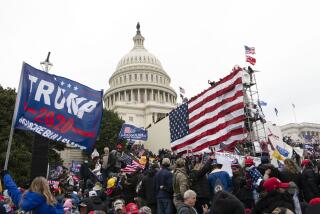Reagan Action on North Urged : Judge Says President Must Decide on Trial Question
- Share via
WASHINGTON — The judge in the Iran-Contra case appealed today for President Reagan to decide once and for all whether to let Oliver L. North stand trial and thereby risk the disclosure of national security secrets.
U.S. District Judge Gerhard A. Gesell warned that if the former White House aide went to trial, probably in late January, the court would have “very little control” over the testimony of many witnesses “acquainted with high-security matters.”
The judge invited a final Administration decision on the problem, noting the dangers posed by public questioning of current and former government officials who will be called to testify as prosecution witnesses.
‘Difficult Situation’
The testimony of such witnesses, who include former national security adviser Robert McFarlane, presents a “difficult situation for those who may have foreign policy or national security concerns,” Gesell said.
These current and former officials would be subject to intense cross-examination and North’s defense attorneys would have wide latitude to question them about their “involvement in sensitive events other than events relevant under the indictment,” the judge said.
“The Constitution does not permit the court to take this testimony in secret, as did the Congress. It must be public,” Gesell said at the conclusion of a two-hour hearing on North’s motions to dismiss the central conspiracy charges against him.
“The flow of testimony cannot be constantly interrupted by classification experts sitting in the audience,” Gesell said, adding he wouldn’t rule on such problems before a witness takes the stand.
“Accordingly, if on analysis this imminent prospect gives ground for presidential action to protect any perceived threat to the foreign policy obligations which the President has or the intelligence needs of the country, the Constitution and the statutes provide various courses of action he may take,” the judge said.
“The court has a very limited role,” Gesell said. “Under the Constitution, it is the President, not North or any witness, to protect the prerogatives of the President’s office if he deems them unduly threatened.”
Gesell noted that “as far as the court is aware,” the President “has made no effort whatsoever to prevent this case from going forward” and “responded generously” to requests for help from independent counsel Lawrence E. Walsh.
“The President continues to have statutory authority, and no doubt constitutional power, to withhold any letter, cable, memorandum, tape recording or other written material, regardless of its relevance or materiality to the case, if he deems that appropriate in terms of the prerogatives of his office,” Gesell said.
Though he made no ruling, Gesell indicated he would grant Walsh’s request to bar North from introducing as evidence about 40,000 pages of classified documents.
More to Read
Sign up for Essential California
The most important California stories and recommendations in your inbox every morning.
You may occasionally receive promotional content from the Los Angeles Times.










